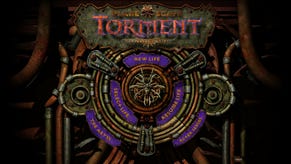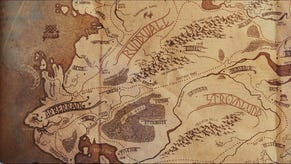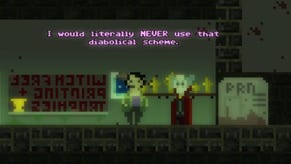Re-Retrospective: Planescape: Torment
This retrospective post was originally published on RPS in 2007, and we repost it here to celebrate the arrival of Planescape: Torment on Good Old Games. It was first written by Kieron for PC Gamer. Some spoilers follow, but nothing absolutely critical.
Ignored by the gaming press upon release, only receiving warmish reviews that stopped well short of open adulation and the victim of one of the most ill-judged marketing campaigns (“A corpse with irresistible sexual charisma”) in history, Planescape Torment is the classic Underdog. Inevitably, it became the (relatively speaking) commercial runt of the Baldur’s Gate litter. In the years since, the coin of its critical worth has accumulated to the point where aficionados regularly cite it as the greatest of the PC RPGs. In fact, it’s rehabilitation has gone too far, with its name being a simple byword for narrative excellence without anyone really feeling the need to say why. There’s more here than dogmatic romantic myth.
Understand, there’s dozens of ways narrative can operate in videogames. Most modern examples take a cinematic bent… one which Planescape rejects. Its narrative is carried primarily on the back of pure words. While in terms of function – stats, roaming around levels, weapons, hitting the monsters - it’s got everything its sister Baldur’s Gate game, it’s heart is in its conversations. People talk. You, through the vast array of multiple options, reply. And it’s magical. In fact, in many ways, Planescape is the reinvention of the text adventure into the modern age, leaving the visuals for everything they’re good at, while leaning on the words to provide emotional resonance.
Don’t underestimate text as a tool for creating emotion. It’s brutally efficient. The effort to create a cutscene which shows a Demon destroying all reality is months of work. The effort to write it? Hey – I’ve just done it. And while it doesn’t have the immediate impact, the fact that Text allows you to throw dozens of these sensations at the player all adds up: every few minutes a line of text or a concept hits you like a nail gun through the heart. With 800,000 words of script, Planescape often feels like the world’s biggest choose-your-own-adventure book.
The numbers don’t tell the full story of how much – well – the story is stressed. For example, more experience points are gathered by simple conversations than slaughtering the opposition. Hell: this is the one RPG whose final encounter’s best solution is achieved through an exchange of words rather than an exchange of blows.
Which isn’t to say that the story it chooses to tell is original. It’s the archetypal videogame story of an amnesiac hero trying to discover what’s going on, favoured by developers since the beginning of time as a means to make the hero’s perspective of the world be identical to the players. But Planescape is the total exemplar of this plot. The issue of identity and memory permeates the entire tale rather than acting as a mere introductory tool.
It’s this following of concepts to the ultimate degree is what characterizes Planescape. Take, for example, its “lives”. In games, you always come back from an encounter, returning to an earlier save. You are, effectively, immortal. In Planescape, this is made literally true with you raising from the grave every time you’re struck down. This ability is the backbone of the plot – why are you trapped in an eternally renewing existence? - with opportunities arising to actively manipulate this odd curse. Take, for example, the woman who wants to kill you just to know what it’s like to strike someone down. Or getting people to root around in your body, in the process killing you, trying to see if anything has been left inside your perpetually returning form.
It also has style. Planescape Torment looks at the videogame, understands its structure, realizes what’s laughable and notable about it… and then takes it as far as the developers were able. It’s even got a gleeful, intelligent post-modern edge. Take, to choose an entirely throw-away example, the section where you find yourself inside a Modron cube, a mechanical auto-generating dungeon which exists as a parody of the RPG’s archetypal structure. The rooms are simple squares, as in the ancient D&D games. The robotic constructs which guard it offer self-analytical dialogue (I am a low level construct – I offer little threat) before dropping ironic treasure such as Coins!, A Magic Item! And A Clue!. Yes, it’s a little big smug, but you’re in on the joke, so all is fine.
But while capable of mockery, Planescape really can’t help but love the RPG and be enamored about its potential to move the lower, sadder registers of the human experience. Remember: “Planescape” is the baroque Dungeons and Dragon world which the story is set. The game is actually entitled “Torment”. Dwell on that a little.
Now, while it’s the cliché of the lost-memory genre that, if you are hunting a murderer, that you are the killer, Torment, with a character whose actions have stretched back centuries, has impacted on the world in hundreds of ways. You have been killers beyond measure and carry the sins of entire worlds. How do you feel about this? What are you going to do about it? Sometimes the entire game feels like a question mark. Is it going to turn into something rhetorical or can you actually provide the answers?
While we’re a long way from the videogame equivalent of a Tolstoy or a Dostoevsky, for what it’s worth, Planescape is as close as we’ve come, and worthy of real literary consideration. Of course, such dry analysis always turns people away from the Great dead Russians – when it should be remembered these are works full of life and joys and – yes - deep sadness. The same is true here. It’s a philosophical buddy-hatey road movie based around the search for the self and the endlessly reiterated question “What can change the nature of a man?”. And you find yourself lingering on that. Not just what can change the nature of your character – but what made you and what manner of man are you anyway.
Irony – a game all based on amnesia turns out to be something you’ll never forget.












